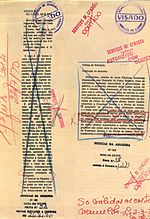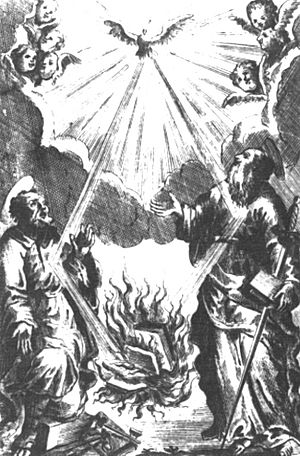Censorship facts for kids
Censorship is when an authority (such as a government or religion) cuts out or suppresses communication.
This has been done widely. All countries, religions and societies have their limits as to what can be said, or written or communication by art or nowadays by computer.
Certain facts are changed or removed on purpose. This may be done because it is considered wrong, harmful, sensitive, or inconvenient to the government or other authority. This can be done for different reasons.
A censor is a person whose job is to look at all types of media and remove material. There are many reasons to censor something, like protecting military secrets, stopping immoral or anti-religious works, or keeping political power. Censorship is almost always used as an insult, and there is much debate over what censorship is and when it is okay.
When there is freedom of speech and freedom of the press, most information can published. However, even in developed countries with much freedom of the press, there are some things that cannot be published. For example, journalists are usually not allowed to publish many secrets about the military, like where troops will be sent on a mission. For these reasons, the government might arrest anyone who publishes it.
Reasons
Most often things are censored for one or more of the following reasons:
- Moral censorship: It is thought that certain facts may be inappropriate for the audience.
- Military censorship: In a war, all news reports might be censored. This is done to guarantee that the enemy cannot get information that might be used to plan an attack. Very often, this includes the size of military troops, but also the strategies and tactics used
- Political censorship: A government (or a political party) may hold back certain kinds of information. This is done to avoid rebellions or embarrassment.
- Religious censorship: Often, there is a dominant religion which removes or changes certain kinds of information. Examples for this are the Vatican censoring Galileo Galilei, or the Iranian Ayatollah Khomeini banning The Satanic Verses, a novel by Salman Rushdie. In Romania, many schools no longer teach evolution, and many schools in the US and UK refuse to discuss Creationism.
- Corporate censorship: (Often large) businesses stop the publication of material because it shows some of their business idea, or their employees in a bad light.
Debate
There is much debate about when censorship should be allowed. For example, U.S. President Richard Nixon censored the New York Times when they tried to publish articles about the Pentagon Papers, a group of classified military documents that showed that Nixon and the military lied about the Vietnam War. The Supreme Court in New York Times Co v. United States overturned the censorship, saying that Nixon had not shown it would be dangerous to the military, just embarrassing. In other countries, journalists and bloggers (who are usually not seen as journalists) are sometimes arrested for saying bad things about the government. In Egypt, Kareem Amer was famously arrested for insulting Islam and calling the president of Egypt, Hosni Mubarak, a dictator.
Non-governmental censorship
Governments are not the only ones who censor information. For example, when the history department at Middlebury College did not allow professors to accept Wikipedia as a source in papers, some said it was censorship. This was because the department was telling professors (who usually have academic freedom) what works they should and should not accept. Sometimes, a group or a website will not allow some facts, articles, and pictures that they do not think should be seen. There is much debate over the difference between censorship and editing, that is, deciding what should or should not be published.
Related pages
- Movie censorship
- Censorship by Google
- Reporters Without Borders
- Wikileaks
Images for kids
-
The daily newspaper of Wrocław, Polish People's Republic, March 20–21, 1981, with censor intervention on first and last pages – under the headlines "Co zdarzyło się w Bydgoszczy?" (What happened in Bydgoszcz?) and "Pogotowie strajkowe w całym kraju" (Country-wide strike alert). The censor had removed a section regarding the strike alert; hence the workers in the printing house blanked out an official propaganda section. The right-hand page also includes a hand-written confirmation of that decision by the local Solidarity trade union.
-
Historic Russian censorship. Book Notes of my life by N.I. Grech, published in St. Petersburg 1886 by A.S. Suvorin. The censored text was replaced by dots.
-
Author Ozzie Zehner self-censored the American edition of his environmental book, Green Illusions, fearing food libel laws.
See also
 In Spanish: Censura para niños
In Spanish: Censura para niños










